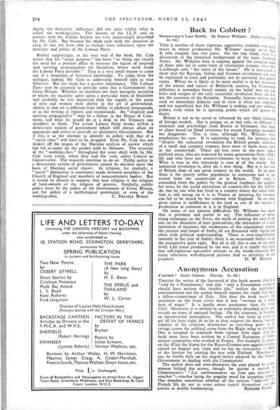Anonymous Accusation
J'accuse ! Andre Simone. (Harrap. 8s. 6d.)
THOUGH the writer of the foreword of this book asserts that it is " told by a Frenchman," and that " only a Frenchman could Or ■ should have written this terrible tale," neither the publisher's announcement nor the author himself repeats the claim that he is a fellow-countryman of Zola. Nor does the book justify the statement on the front cover that it was " written in a white heat of anger." It is hardly more passionate than the Code Civil. Moreover, it is written in an extremely detached spirit, and reveals no trace of national feeling. On the contrary, it breathes an international atmosphere. The author has been at pains to get all his facts right, in so far as they support his thesis, but the asperity of his criticism diminishes to vanishing point as be swings across the political arena from the Right wing to the Left. One is tempted to conclude from various little signs that the book must have been written by a Central European of Com- munist sympathies who worked in France. For example, he Places on the Allies the blame for the Russo-German non-aggression pact signed on August 3rd, 1939, and he has no reproaches to make to the Soviets for starting the war with Finland. Needless to say, he dwells fully on the stupid tactics adopted by the French Government in dealing with the Communists. The author does not over-dramatise the part played by a f6, women behind the scenes, though he quotes a remark a Clemenceau's "Les parlementaires ne font que toucher el toucher "—toucher being the popular word. for accepting money One wonders sometimes whether all the various "rake-offs" in French life do not to some extent cancel themselves out






































 Previous page
Previous page